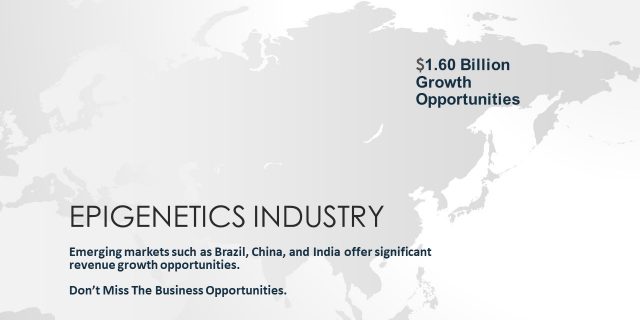
What This
Report Will Provide?
This study involved
four major activities in estimating the current size of the epigenetics market.
Exhaustive secondary research was carried out to collect information on the
market, its peer markets, and its parent market.
The next step was to validate these findings, assumptions, and sizing with
industry experts across the value chain through primary research. Both top-down
and bottom-up approaches were employed to estimate the complete market size.
After that, market breakdown and data triangulation procedures were used to
estimate the size of segments and subsegments.
Expected Revenue Growth:
[230 Pages Report] The global epigenetics market is
projected to reach USD 1.60 billion by 2022 from USD 0.85 billion in 2016, at a
CAGR of 13.3% from 2017 to 2022.
Major Growth Boosters:
The growth in epigenetics
market is primarily attributed to
decreasing sequencing costs, increasing research activity, funding for
epigenetics research, rising prevalence of cancer and growing applications of
epigenetics in non-oncology diseases. Expanding application areas of
epigenetics in non-oncology diseases, personalized medicine, and target therapy
are expected to provide growth opportunities for players operating in the
market in the coming years.
Download PDF Brochure:
https://www.marketsandmarkets.com/pdfdownloadNew.asp?id=896
Selected Market Dynamics of Epigenetics:
Raising Cancer Prevalence:
Globally, there has been a significant
increase in the number of people suffering from cancer. According to WHO
estimates, the number of people suffering from cancer is expected to increase
to 19.3 million by 2025 from 14.1 million in 2012. Cancer is the second leading
cause of death in the US and accounts for nearly 1 in every 4 deaths.
Epigenetic changes such as dysregulation of DNA methylation are associated with
cancer development and progression. Epigenetics provides new opportunities for
deriving therapeutic strategies designed to reverse dysregulation in cancer.
Several cancer research studies that utilize epigenetics techniques are
currently underway; significant investments are being made to support these
researches. The increasing prevalence of cancer will drive epigenetics research
focused on this condition.
Major Market Developments:
In July 2017, Agilent launched AriaDx Real-Time PCR System
In June 2017, Illumina launched Extended RAS Panel, a NGS kit
In January 2017, Illumina entered into an agreement with Koninklijke Philips
(Netherlands) to integrate Ilumina’s sequencing systems with Philips’
IntelliSpace Genomics clinical informatics platform for oncology
Application of Epigenetics in Oncology:
Oncology is one of those
applications where epigenetics technology is extensively used for deriving
therapeutic strategies designed to reverse transcriptional abnormalities
inherent to the cancer epigenome. The disruption of epigenetic modifications,
such as DNA methylation and histone modification, results in altered gene
function or expression and cellular transformation leading cancer. Epigenetics
assists in the development of inhibitors of DNA methyltransferases and histone
deacetylases (HDACs), which have been found to be clinically effective in
cancer treatment, attesting to the value of epigenetic therapies in oncology.
Request Sample Report:
https://www.marketsandmarkets.com/requestsampleNew.asp?id=896
Key Players:
The global epigenetics market is characterized by a large number
of players. The prominent players of this market are
Illumina (US), Thermo Fisher (US), Diagenode (Belgium), QIAGEN (Netherlands),
Merck Millipore (US), Abcam (UK), Active Motif (US), New England Biolabs (US),
Agilent (US), Zymo Research (US), PerkinElmer (US), Bio-Rad (US). These
companies are pursuing several organic and inorganic growth strategies such as
acquisitions, collaboration, partnerships, agreements, expansions, and product
launches.


